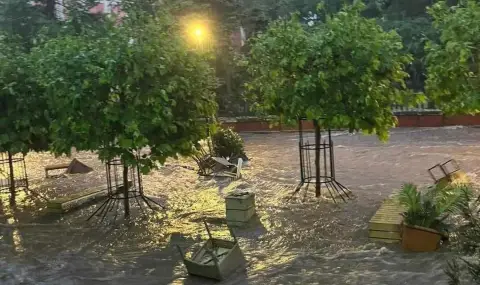The long-term forecast until the end of the century predicts that drought will increasingly plague southern Bulgaria, and the northern part of the country will have to contend with floods and tornadoes. The analysis of hydrologists and meteorologists considers two scenarios - realistic and pessimistic.
That sums up BNT.
According to the first, in the coming years the average temperatures will rise between 1 and 2 degrees, but according to the pessimistic version - the degrees may jump by six. According to both forecasts, droughts will be longer and longer. Precipitation is expected to decrease between 5 and 30%, and heat waves will last between 5 and 10 days longer on average. Against this backdrop, we will often witness short-lived but intense rainfall leading to flooding.
"Many people ask me - what kind of olives do you sell - whether they are green or black. All olives are green - after September, October - they start to turn black", says Yovko Aylov, an olive grower in Rakovski.
Olives, oranges, tangerines are only a small part of the fruit trees that Yovko Aylov has been growing in Rakovski for more than 10 years.
"With the changes in the climate in Bulgaria, olives began to be grown en masse. One of the varieties is that created for olive oil production. Very oily, this is the olive that gives the best quality olive oil in the whole world," he explains.
Warm winters allow more places in our country to grow plants characteristic of Greece and Turkey.
"They started planting a lot of pistachios, olives, various figs, many pomegranates, more exotic varieties that are not typical for Bulgaria,'' Yovko Ailov points out.
But how will the climate change in Bulgaria? To find out - from Rakovski we go to Switzerland to the Federal Institute of Technology in Lausanne, where Doctor Valentin Simeonov works.
"Heat waves, fires, floods, hail - they will increase both in strength and duration," explained Dr. Valentin Simeonov, Federal Institute of Technology, Lausanne, Switzerland.
And the reason for this lies even in frequent visits to the ballot boxes.
"Some draconian forest conservation laws should be passed and the practice of giving away firewood to win voters - it would be better to replace it with giving out coal, it would be more environmentally friendly, because the loss of the forest is an incomparably greater loss than the release of greenhouse gases from the burning of coal," says Dr. Valentin Simeonov.
Forests are a natural regulator of temperatures and floods. The older and more natural a forest is, the more serious the prevention. The main threat to forests, apart from logging, is fires. Bulgaria remains one of the few countries with a large forest fund that does not have an aircraft for extinguishing fires in hard-to-reach areas.
"In France there is a rule of 3x30. At temperatures above 30 degrees, wind speed below 30 km/h and humidity below 30%, all access to the forests is prohibited due to the danger of fires," explains Dr. Valentin Simeonov.
According to the long-term analysis of the Institute of Meteorology and Hydrology. In the coming years, the water in the rivers in southern Bulgaria is expected to decrease by nearly 20%. Short but intense rains to cause flooding in Northern Bulgaria, as well as along the Southern Black Sea coast. A stormy wind, even a tornado can be observed in North-Eastern Bulgaria.
"Unlike politics, there is no vacuum in nature, we are all subject to change, including our country. For the coming years, we will certainly witness a large number of intense rainfalls that will lead to floods. We will witness a long number of days without precipitation - that is, an increase in the intensity of the drought, and the worst thing is that these mutually exclusive phenomena will go hand in hand", says Simeon Matev, climatologist.
